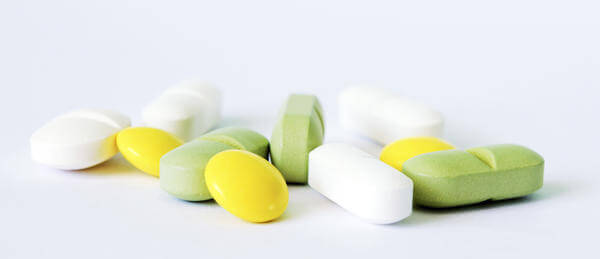Can You Get High on Naproxen?
The name Naproxen sounds like some high-level, super potent drug, doesn’t it? You might not have the same opinion when you learn that it’s just the generic name for Aleve. That’s right, Aleve, the very basic, over-the-counter pain medication that just about every mom in America keeps tucked away in her purse.
You might be asking, “Aleve is going to get me high?” I’m not saying it will, but there is a segment of the online community that seems to believe it has some recreational value. Needless to say, I was skeptical.
In this article:
It’s Really Just Aleve?
It’s an OTC pain medication. Naproxen reduces hormones that cause inflammation and also controls pain in different parts of the body. It is often used to transition patients off of other pain medications and is referred to in these cases as a “bridge therapy.”
Naproxen is what is commonly known as a non-steroidal anti-inflammatory drug (NSAID). It was created in the 1970s, and first sold as the prescription drug Naprosyn. As time went on, more brands started to emerge, including Anaprox, Flanax, Naprelan, and the well-known Aleve.
The drug is in the same class as Ibuprofen, and much like Ibuprofen is used to treat varying degrees of pain that come from headaches and muscle aches, along with stiffness and swelling. It is most commonly distributed as an orally-ingested tablet, and doses will vary depending on the specific symptom or ailment being treated.
Recreational Use
Does it have recreational value? My initial findings suggested not. From the Drugs.com Q&A page:
“Naproxen has absolutely zero potential for abuse, addiction, recreation, is not a “street drug” of any kind.”
So where were these claims of a Naproxen high coming from? I decided I’d have to do some more digging to learn the details behind this mysterious belief.
What Is Naproxen Good For?
Naproxen is good for treating pain, fevers, and inflammation. It is commonly used to help control these symptoms when they are caused by migraines, arthritis, gout, menstruation, tendinitis, bursitis, and several other conditions.
In its delayed or extended release forms, Naproxen can also be used to help alleviate the pain associated with chronic conditions like ankylosing spondylitis.
How Does Naproxen High Feel?
One story detailed a user who felt some odd-effects after taking Naproxen:
“So I took 2 gel-caps of Aleve 220mg each and now I’m loopy. I usually only take one I don’t feel bad, but kinda druggy and euphoric. I can’t be the only weirdo who reacts to this stuff? I look like an idiot when someone asks me what’s wrong, if Im drunk and I’m like, ‘Oh, I took ALEVE’.”
As a commenter quickly pointed out, though, this is not typical and was probably an “idiosyncratic reaction” that fell outside the normal range of responses to Naproxen.
This couldn’t have been what the majority of people were referring to when talking about a Naproxen high, though, could it? I read some more firsthand accounts, and came across this:
“Does anyone else use Aleve to potentiate their opiates? I know it’s in the potentiation guide, too, but it doesn’t speak much to the effects I experience. I prefer to rail 30mg IRs and I swear that 2 Aleve between 45-2hrs before doing em makes them more euphoric, energetic and enduring (the 3E’s- just made that up on the fly. deal with it.).
I’ve tried doing them with and without multiple times under the same conditions and I swear it makes a difference, amid protests from my friends that it’s bullshit.“
So, the belief wasn’t that Naproxen on its own was causing the high, but rather Naproxen was making other substances more potent. Sadly, this theory was also shot down:
“It is bullshit. Aleve and Opiates work synergistically for pain. Not for pleasure. The theory is that (assuming 1mg=1mg in terms of potency) 8mg of oxycodone and 2mg of Naproxen is more efficacious than 10mg oxycodone. On the margin adding Naproxen is more effective than additional opioids.
However, this is strictly for pain. In terms of affect on euphoric receptors NSAID/Aspirin/APAP and other pain-relievers do nothing for our euphoria.”
Other sources suggest that the possible recreational effects of Naproxen may have more to do with that person’s individual makeup as opposed to Naproxen having recreational value. In other words, there’s a small chance you could be one of the few who actually experience some sort of unintended side effects from taking the drug.
“Naproxen can actually cause lightheadedness, visual disturbances and drowsiness in a small percentage of users. Naproxen does not cause true euphoric feelings nor can it get someone ‘high’. Users who try taking higher doses thinking they can get high risk kidney failure and bleeding ulcerations in the stomach.”
And there you have it. It seemed unlikely that taking Naproxen would do anything beyond relieve my shoulder pain, but I decided to try it out, just to be thorough.
I Had To Give it a Shot
It was time to put the Naproxen + Opiates theory to the test. Not keen on mixing drugs together, though, I decided to go low grade, with some Codeine. I took 2 Aleve. Then, about an hour later I followed that up with 30mg of Codeine. What did I experience? No enhancement whatsoever. I just felt that same general weirdness that Codeine provides. As I suspected, this claim was bunk. I can’t really speak to how the drug interacts with more serious opiates. But, since I didn’t experience absolutely any enhancement to the Codeine when I tried this method, I’m not sure I buy the idea that this has any potential to work at all. Plus, considering the potentially dangerous nature of powerful opiates, I think it’s best to just leave this one alone.
The People Have Spoken
As our first hand accounts show, Naproxen is useful for treating mild to moderate pain and not much else.
You’ll find the odd individual here or there who gets a weird high from it, and the occasional individual who experiences a placebo effect and ends up thinking it’s increasing their high from other drugs, but this seems atypical and not representative of your likely experience using Naproxen. When you consider some of the side effects below, (especially the ones of the liver and kidney variety) it doesn’t seem like it’s worth the effort to try and find out.
Side Effects
There are some common side effects associated with using Naproxen, stuff like gastrointestinal distress, nausea, heartburn, headache or dizziness. In some cases, it might raise blood pressure, so it should be used cautiously by those who may be at risk for high blood pressure. There are also some more serious side effects that are sometimes associated with the drug. However, they appear to have a very low rate of incidence. Extended use of Naproxen can also pose a threat to your liver, so be wary of that as well. Overdose levels of Naproxen can cause kidney failure. In other words, it’s still potentially dangerous, even as an OTC drug.
In addition, Naproxen poses a moderate risk of stomach ulcers. A doctor can advise on the best way to mitigate this risk.
Wrapping it Up
Naproxen will help you if used clinically for pain, but all the talk of it providing some high or having a recreational purpose is just that—talk. Stick to other recreational compounds if you’re looking for a unique trip, and leave this one in the medicine cabinet until you have a headache. Your liver and kidneys will thank you for it.
[catlist excludeposts=this template="div" conditional_title_tag="h6" conditional_title="Getting high" tags="getting-high"]

